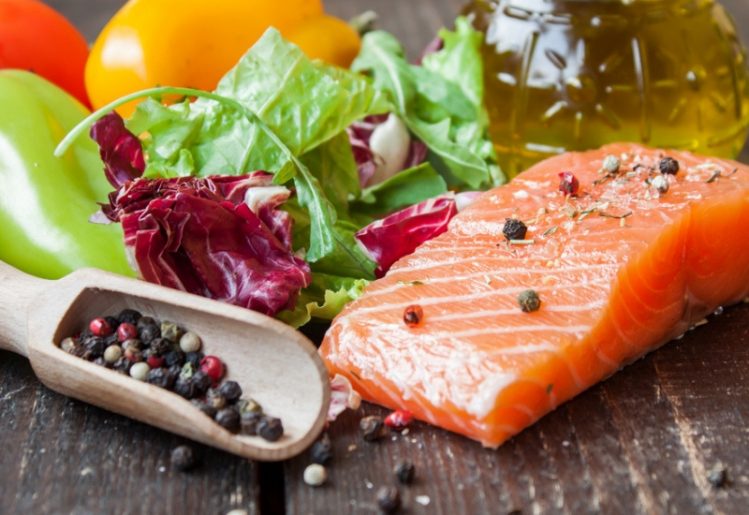Past research has confirmed that trillions of microorganisms thrive in our large intestines, comprising what we call the gut microbiome. This collection of bacteria influences our health in a variety of ways, including how likely we are to develop medical conditions such as Crohn’s disease, inflammatory bowel disease and irritable bowel syndrome. Research has found that one of the primary ways that bacteria is introduced into this system is through the foods we eat, leading researchers to study how diet can affect the gut microbiome. Now that we recognize the importance of a healthy gut microbiome, new research focuses on how to develop a more diverse population of gut bacteria.
Which Foods Promote a Healthy Gut Microbiome?
 In a recen tstudy led by Laura Bolte, a researcher at the University Medical Center Groningen, researchers looked at how 160 different factors in an individual’s diet affected their gut microbiome. The subjects chosen for the study were separated into four different groups: subjects with Crohn’s disease, subjects with ulcerative colitis, subjects with irritable bowel syndrome and subjects who had not been diagnosed with any digestive disorder.
In a recen tstudy led by Laura Bolte, a researcher at the University Medical Center Groningen, researchers looked at how 160 different factors in an individual’s diet affected their gut microbiome. The subjects chosen for the study were separated into four different groups: subjects with Crohn’s disease, subjects with ulcerative colitis, subjects with irritable bowel syndrome and subjects who had not been diagnosed with any digestive disorder.
To conduct their study, the researchers collected stool samples from each subject, while also asking each subject to complete a food frequency survey. They were able to link 61 foods to 123 classifications of bacteria. They also found that 49 foods could be linked to specific microbial groups. This helped the team determine that the Mediterranean diet was the best for promoting a healthier and more diverse gut microbiome.
The Mediterranean diet consists of consuming a greater quantity of plant-based foods, particularly nuts, seeds, vegetables and legumes. While meat portions are minimized, they are still an important part of this type of diet. Meats, such as fish, poultry and lean red meat are permitted in smaller portions. Red wine is also a staple of this diet.
The foods in a Mediterranean diet help reduce the amount of harmful bacteria in the gut, while allowing more helpful microbes to thrive. This is important because a low quantity of short-chain fatty acids has been linked to inflammatory digestive problems such as ulcerative colitis. Eating more plant-based foods helps introduce more short-chain fatty acids into the gut.
What Types of Fiber are Best for Your Gut Microbiome?
Past research has also found that fiber is essential to a healthy gut microbiome, but all fiber may not have the same effects on the gut. While we know that eating a minimum of 22 grams of fiber will help reduce our risks of developing type 2 diabetes, heart disease and other medical conditions, a new study sought to identify which types of fiber interact best with our gut microbiome.
For the study, researchers used mice that were bred to be sterile and lacked their own gut microbiomes. The mice were given 20 strains of a common type of human gut bacteria and were given high-fiber diets for a four-week period. The researchers fed the mice different types of fiber, derived from a variety of sources. Some of the fiber sources included peas, citrus fruits, tomato peels, oranges, apples, cocoa, rice bran and chia seeds.
As the mice were fed a variety of fiber-rich diets, the researchers analyzed how bacterial strains in the gut interacted with each type of fiber. The study revealed that fiber obtained from peas, orange peels and rice bran had the biggest and most beneficial impact on the gut microbiome. They also found that probiotic and prebiotic foods had a strong effect on the gut microbiome. Thus, it appears that high-fiber foods that contain probiotics and prebiotics are ideal in helping to maintain a healthy gut.
How Else Can You Improve the Health of Your Gut Microbiome?
Take a High-Quality Prebiotic/Probiotic Supplement
Each type of food delivers a different selection of bacteria into the gut, so the diversity of your gut microbiome may be limited by the foods you consume. Taking a high-quality daily supplement that provides both probiotics and prebiotics can help your gut microbiome thrive by giving your gut the nutrients and compounds it needs on a daily basis. It can also help you keep your gut healthier and more diverse.
Lower Sugar Intake
An essential part to adopting a healthier diet rich in beneficial bacteria is reducing your sugar intake. Studies have shown that foods and beverages rich in either sugar or artificial sweeteners will cause an imbalance of helpful gut bacteria. This can lead to metabolic disease.
Reduce Stress Levels
 Emotional stress has been shown to influence the physical body, especially in terms of disrupting the activities of the microbes in the gut. For this reason, engaging in relaxing activities, such as reading, yoga or meditation, can help keep your gut healthier.
Emotional stress has been shown to influence the physical body, especially in terms of disrupting the activities of the microbes in the gut. For this reason, engaging in relaxing activities, such as reading, yoga or meditation, can help keep your gut healthier.
Exercise Every Day
Research has found that athletes have more diverse gut microbiomes than those who live sedentary lifestyles. While athletes likely eat healthier foods and that will partly account for their diverse gut bacteria, it’s also believed that physical exercise helps keep the gut healthy. It controls weight and encourages healthy weight loss, which may be one way that physical activity keeps the gut healthy on a microbial level.
Get Enough Quality Sleep
While you’re asleep, the body is hard at work repairing damage, improving muscular health and performing a variety of other functions. This may also be a time when the gut microbiome is becoming stronger, because research has found that insufficient sleep leads to a compromised gut microbiome. People who don’t get at least seven hours of quality sleep are at a greater risk of developing inflammatory intestinal diseases.


